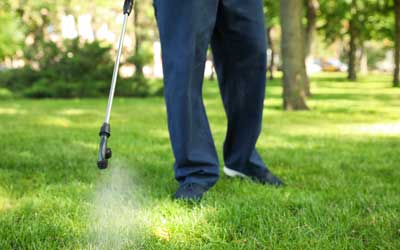Comprehending the Various Methods to Parasite Control: A Comprehensive Overview

All-natural Bug Control Techniques
Employing eco-friendly techniques such as friend planting and biological parasite control is necessary for properly managing insects in farming setups. Buddy growing involves growing different crops in closeness to hinder parasites, enhance nutrient uptake, and enhance overall crop health.
Biological insect control involves presenting natural killers or virus to regulate pest populations. Ladybugs, for circumstances, prey on aphids, regulating their numbers without the requirement for chemical pesticides. Another example is using Bacillus thuringiensis (Bt), a microorganism that targets particular insect bugs while being harmless to people, animals, and useful pests.
These environmentally friendly techniques not just minimize the dependence on synthetic pesticides but additionally help maintain biodiversity and dirt health. By incorporating all-natural parasite control techniques right into agricultural methods, farmers can accomplish lasting parasite management while decreasing adverse influence on the environment.

Chemical Pest Control Solutions
In addition to all-natural insect control approaches, the application of chemical pest control solutions plays a substantial role in properly handling pest populations in agricultural settings. Chemical parasite control remedies are created to target specific bugs that may cause extensive damage to crops. These solutions usually consist of synthetic pesticides that are developed to eliminate pests rapidly and effectively.
Among the key benefits of chemical bug control solutions is their efficiency in regulating parasite problems widespread. Farmers can use these options utilizing various techniques such as spraying, airing out, or seed treatment to protect their plants from damaging pests, weeds, and diseases. In addition, chemical parasite control services are relatively simple to use and can offer quick outcomes, helping farmers secure their returns and reduce economic losses.
Nevertheless, it is necessary to make use of chemical bug control remedies judiciously to reduce prospective adverse effect on the atmosphere, non-target organisms, and human health and wellness. Appropriate application techniques, adherence to safety and security standards, and normal tracking are critical to ensure the liable use chemical parasite control remedies in farming techniques.
Organic Bug Control Approaches
Organic parasite control approaches take advantage of natural predators or virus to take care of parasite populaces in farming settings successfully. One usual biological control technique is the introduction of natural adversaries, such as ladybugs or parasitical wasps, to target specific pests.
An additional organic control method includes making use of virus like germs, infections, or fungi to contaminate and kill parasites. These microbial agents can be splashed on plants or presented right into the dirt to fight different parasites without harming advantageous pests or various other wildlife. Additionally, making use of pheromones to interfere with the breeding patterns of parasites is one more effective organic control approach. By disrupting their reproduction, this technique aids to reduce parasite populaces without the requirement for chemical intervention. Generally, biological parasite control techniques provide a lasting and targeted solution to pest see it here monitoring in agriculture.
Integrated Pest Administration (IPM)
Integrated Pest Administration (IPM) is a detailed strategy that integrates various parasite control strategies to successfully handle and lessen pest populations in farming systems. IPM focuses on long-lasting prevention of bugs through a combination of biological, social, physical, and chemical control approaches. By integrating these different techniques, IPM aims to reduce reliance on chemical pesticides, lessen ecological influence, and advertise sustainable insect administration techniques.
One secret facet of IPM is making use of biological controls such as all-natural predators, parasites, and microorganisms to regulate parasite populaces. This technique takes advantage of the power of nature to maintain an equilibrium between insects and their all-natural adversaries without triggering injury to the setting.
Additionally, IPM entails social techniques like crop environment, turning, and sanitation manipulation to produce undesirable problems for pests and interrupt their life cycles. Physical controls such as read this obstacles, catches, and mulches are also made use of to avoid bug invasions.
Mechanical and Physical Pest Control Strategies
Using non-chemical methods, such as mechanical and physical pest control strategies, is an important facet of thorough bug monitoring approaches, developing upon the foundation of Integrated Pest Administration's alternative approach. Mechanical insect control includes making use of physical barriers or catches to stop bugs from accessing and damaging crops or frameworks. This method can include techniques like mounting displays on home windows, making use of row covers in agriculture, or using sticky catches to catch bugs.
Physical parasite control methods, on the other hand, focus on straight removing parasites via physical ways. For instance, making use of warmth therapies to eradicate bed insects or vacuuming up pests like ants or crawlers can be efficient means to handle problems without making use of chemicals. By including these physical and mechanical parasite control methods into an Integrated Bug Management plan, people and specialists can lower dependence on pesticides while still successfully reducing and taking care of pest populaces damages.
Verdict

In enhancement to all-natural pest control approaches, the use of chemical insect control services plays a significant function in effectively managing pest populaces in farming environments.One of the essential advantages of chemical pest control remedies is their performance in regulating pest problems on a huge range.Integrated Bug Management (IPM) is a detailed strategy that integrates different parasite control methods to effectively manage and minimize pest populations in agricultural systems.Using non-chemical methods, such as physical and mechanical pest control techniques, is an essential aspect of detailed bug monitoring methods, developing upon the foundation of Integrated Bug Monitoring's all natural method. By including these physical and mechanical pest control techniques right into an Integrated Pest Monitoring strategy, experts and people can minimize dependence on chemicals while still properly reducing and handling pest populations damage.